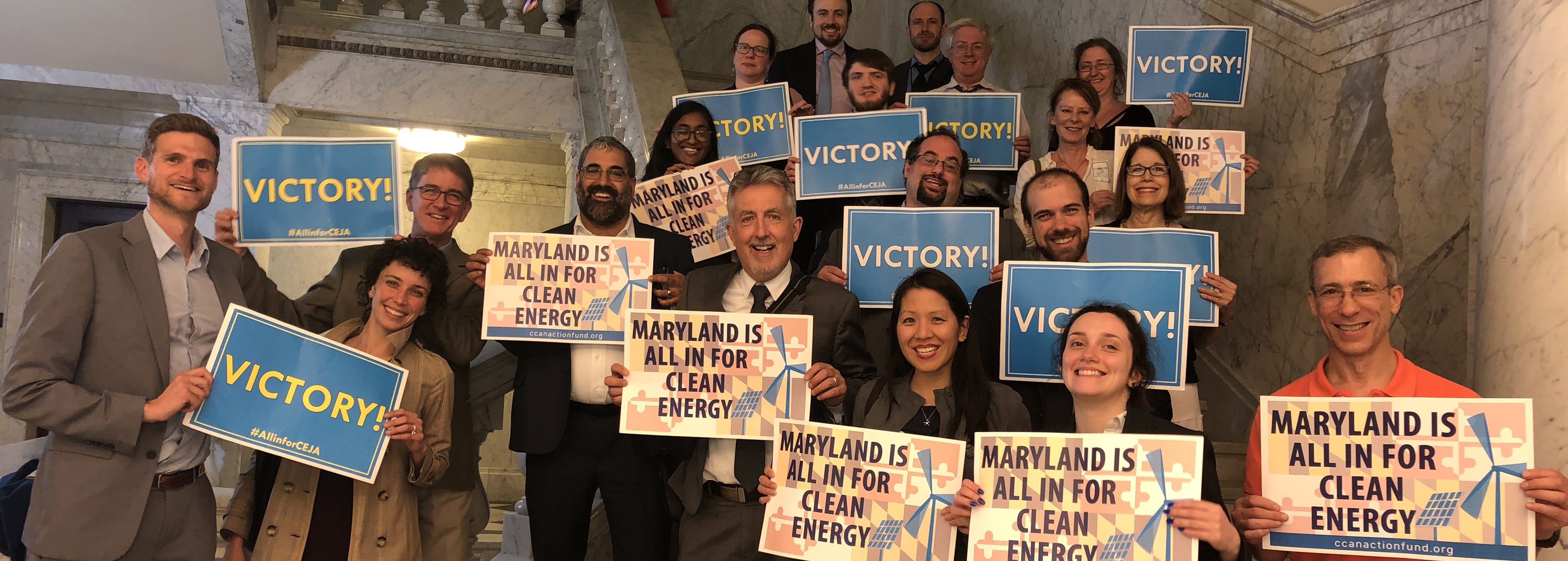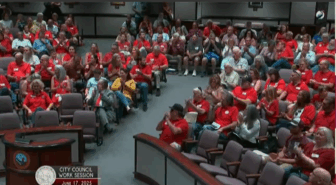Following the action on the floor from atop the Maryland State House’s Senate chamber during the 2019 legislative session’s final hours, the CCAN team was tired but alert with anticipation after an entire day mingling with lobbyists and policymakers in Annapolis. Looking down onto the space’s grey-stroked cream marble pillars and wall paneling, gleaming wooden tables and leather chairs and crimson carpet embellished with the state seal, I could smell the musty scent of history being made time and time again.

CCAN had spent two years pushing for the Clean Energy Jobs Act. The act aimed to double Maryland’s renewable energy to 50 percent of its total electricity consumption and create tens of thousands of solar and wind jobs by 2030 in an equitable transition to a clean energy economy. These were the last moments that would determine the result of all the unwavering energy the organization and its partners had poured into the bill. CCAN communications director Denise Robbins, digital campaign coordinator Stacy Miller and executive director Mike Tidwell sat by me, expecting it to pass. Although I’d only been helping with the Clean Energy Jobs Act for the past three months as a communications intern, I shared with them a strong desire and stomach-suspending excitement to witness the approval of the legislation now.
When I first walked into CCAN’s quaint little headquarters on the edge of Takoma Park at the beginning of the year, I knew I wanted to contribute to the nonprofit’s determined efforts to catalyze regional policies combating climate change. I also intended to enhance my social media, search engine optimization and letter to the editor and op-ed writing skills. But with a journalism background that had restricted me from publicly taking sides, even on environmental issues I cared deeply about, I wasn’t sure exactly what I was getting myself into. Five months and one successful bill later, however, I’m happy to say my CCAN internship exceeded my expectations and taught me more about policy-focused climate advocacy than I could have imagined.

I’ve learned so much I can carry forward in my professional and personal endeavors. Besides getting a refresher on producing opinion pieces, I picked up the art of writing letters to the editor and had the opportunity to write one that Ray Lewis, of Baltimore Ravens fame, placed his name on. I got the hang of drafting effective social media posts and tweets and of identifying ways to improve their impact by applying insights obtained from conducting monthly analyses of the reach, impressions and engagements they achieved. What’s more, I received a solid introduction to using a search engine optimization tool to make web content more prominent and accessible. I also gained experience in putting together campaign communications materials, including video scripts and social media packets for climate activists, and in researching and contacting media outlets and reporters to increase coverage and grassroots support for CCAN events and actions.
Around 10:20 p.m. on April 8, after a nerve-racking saga of proposed amendments and back-and-forths prolonged by adversarial delegates and senators, the Maryland General Assembly passed the Clean Energy Jobs Act. The electronic board to our left showed the Senate vote as 31-15 in bright green and red digits. Combined with a 95-40 victory earlier that evening in the House of Delegates, this gave the statute the votes it needed to override a possible veto from Governor Larry Hogan. While I was abroad for most of the ensuing month, I kept my eyes peeled for news regarding progress on the legislation’s signing. I was glad to find out that on May 24, it turned into law with neither the governor’s rejection nor his signature, committing the state to a path of climate leadership and completely renewable power in just two decades.
One of my biggest takeaways from CCAN is an appreciation for the enormous extent of operations and communications work required to realize significant successes like the Clean Energy Jobs Act. From strategic fundraising to careful messaging, I had little sense of the high level of intricate planning and broad collaboration involved in convincing residents and legislators to back crucial climate policy. I consider myself very lucky to have been able to assist such a dedicated group of climate advocates with their well-deserved history-making win.





